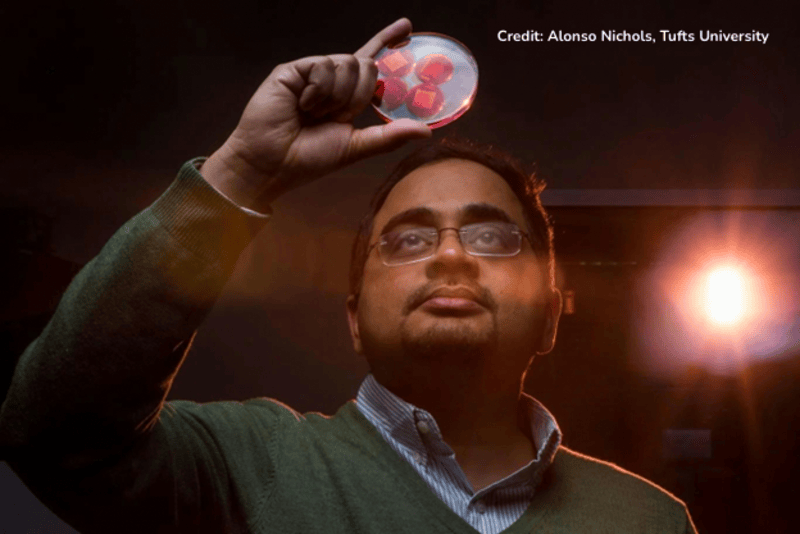In recognition of last month being Autoimmune Awareness Month, the Massachusetts Life Sciences Center (MLSC) is proud to highlight Tufts University and Dr. Sameer Sonkusale’s innovative project, which uses cutting-edge microneedle technology to enhance the delivery and storage of monoclonal antibody medications for the treatment of autoimmune diseases and cancer. Dr. Sonkusale is Professor of Electrical and Computer Engineering with joint appointmenta in the departments of Biomedical Engineering and Chemical and Biological Engineering at Tufts University.
Partnering with Anodyne Nanotech, Dr. Sonkusale was awarded a $745,403 grant from the MLSC’s Novel Therapeutics Delivery program in 2021. His research involved the use of Macro-porous structured hard microneedle technology (MacroPoSH), which is a new class of microneedles originally invented at Tufts University and was further developed by Anodyne Nanotech. The MacroPoSH technology allows for the unique assembly of a freeze-dried form of a drug into the microneedles resulting in an increase of more than 10-fold in transdermal drug delivery dosage compared to other state-of-art technologies. The project focused on formulating and validating MacroPoSH microneedles for Rituximab (RTX), which is a monoclonal antibody medication used to treat several autoimmune diseases and cancer. According to the Autoimmune Association, an estimated 50 million Americans are living with an autoimmune disease, with women making up 80 percent of those affected by autoimmune diseases.
“The MLSC’s support enabled key infrastructure for our work on monoclonal antibody delivery,” said Dr. Hojat Rezaei Nejad, Chief Technology Officer at Anodyne Nanotech. “While distinct from our privately funded GLP-1 program, that investment contributed to platform capabilities that continue to evolve for biologic delivery.”
Monoclonal antibodies such as Rituximab are typically formulated as liquids that exhibit optimal stability at temperatures of -20.0 °C or lower. Sonkusale’s project set out to create a method where these antibodies could be stored in a way that is more cost-effective and efficient. His team succeeded in developing and refining a spray-drying technique for Rituximab, transforming it into a powder and subsequently incorporating the powdered RTX into microneedles. Long-term stability studies showed that the powdered RTX remained stable for up to one year without significant degradation compared to its original liquid form. This breakthrough not only enhances the storage stability of monoclonal antibodies by reducing the risk of chemical degradation, but also alleviates the dependence on cold storage, a significant advancement in the field of pharmaceuticals.
The Novel Therapeutics Delivery program fosters the development of novel technologies and techniques for the delivery of existing or innovative therapies by working at the intersection of engineering, biology, chemistry, and medicine. Specifically, it strives to capitalize and incentivize translational projects to address complex challenges in “therapeutic” delivery – from biomanufacturing, to targeted delivery, to biomaterials and more.
Click here to learn more.



